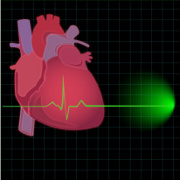 Photo: Getty Images
Photo: Getty Images
Many people believe heart disease is primarily a problem for men. In reality, heart disease is the leading cause of death for both men and women in the United States. But the idea that gender affects heart disease is also correct. Studies show that men and women have different risks for heart disease based on a variety of factors including age and the amount of care they receive for early warning symptoms.
The heart is a collection of muscles that relax to allow blood to flow into the organ then contract to push blood throughout the body. The tissues of the heart, like all other tissues in the body, need a steady supply of blood carrying oxygen and nutrients to stay healthy. The most common cause of heart disease is known as coronary artery disease (CAD). This condition occurs when the blood vessels feeding the tissue of the heart become narrow or blocked. If an artery is completely blocked, part of the heart muscle does not receive food or oxygen. This tissue can be damaged or die so that it can no longer pump blood effectively. CAD starts slowly and builds over time. Many people do not realize they have CAD until heart muscle is damaged and they have a heart attack.
Basic biology seems to indicate that women should be more likely to experience serious heart disease. Women’s bodies are generally smaller than those of men, which means their hearts are smaller and the blood vessels feeding their hearts are smaller. Smaller blood vessels can more easily become blocked, and a smaller heart is more susceptible to failure if even a small portion of the muscle is damaged.
The age factor
But research has shown that young women are actually less likely to develop CAD than are men. Some researchers believe the sex hormone estrogen works to protect the hearts of women during their childbearing years from coronary artery disease. This belief is supported by the fact that women lose this apparent protection at the same approximate age they go through menopause, which is a time when estrogen production in the body drops off.
Medical care
This is not to say that young women do not need to be concerned about CAD. The truth is that anyone with a heart could get heart disease. More than twice as many women die from heart disease as die from all types of cancer combined. (Women’s Heart Foundation) And women may be at increased risk due to differences in the medical care they receive for potential heart disease symptoms. One study by researchers from the National Heart, Lung, and Blood Institute and Harvard Medical School showed that women who were treated at community health clinics were less likely to be sent to see a cardiologist (heart doctor) if they had symptoms of heart disease than women who were treated in a hospital. The study also showed that women were less likely to have follow-up visits with their doctor.
Women of all ages need to be pro-active in recognizing their own risks of heart disease and making sure their health care providers take their concerns seriously. Gender-bias in treating men and women for heart disease still exists, which means some doctors may be less likely to believe women have heart disease than men and may not be as quick to recommend treatment for heart disease in women. Women also need to recognize that taking care of their hearts before menopause, including eating a diet that is low in fat and getting regular exercise, can help lower their risk of heart disease after menopause.
Sources:
National Heart, Lung, and Blood Institute
National Health Institutes: Medline Plus
American Heart Association
Legato, Marianne J., M.D. and Colman, Carol The Female Heart New York: Quill, 2000. Print.
Reviewed June 9, 2011
Edited by Alison Stanton





Add a CommentComments
There are no comments yet. Be the first one and get the conversation started!